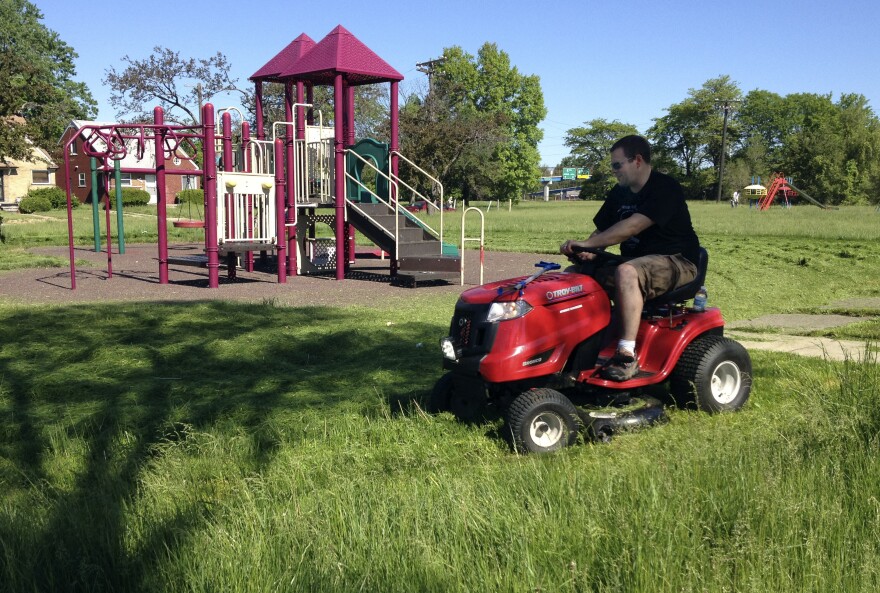- PennEnvironment on Monday released its "Lawn Care Goes Electric" report
- The study ranks states, counties across the U.S. by the amount of emissions gas-powered law tools create
- In 2020, lawn and garden equipment emitted an estimated 965 tons of fine particulates in Pennsylvania
BETHLEHEM, Pa. — Lawn mowers, string trimmers, leaf blowers, chainsaws and other gas-powered equipment not only cause noise and disruption, environmental advocates argued Monday, but also pollution.
"Everyone’s experienced the frustration of listening to the loud roar of lawn care equipment being used nearby, but probably most local residents are unaware of the massive amounts of air pollution being released in their proximity at the same time,” said Ellie Kerns, climate and clean energy associate with PennEnvironment Research & Policy Center.
“The good news is, we no longer have to put up with it because cleaner, quieter electric lawn equipment is capable, affordable and readily available."
PennEnvironment on Monday released a new report, “Lawn Care Goes Electric” and a dashboard, ranking emissions from gas-powered lawn and garden equipment by state and county across the U.S. Made up of particulate matter, carbon dioxide and cancer-causing chemicals, those emissions can work to not only harm human health, but also drive climate change. Electric equipment, advocates argue, is healthier for the environment and for residents.
Lehigh and Northampton ranked ninth and 15th, respectively, out of the commonwealth’s 67 counties, for the amount of pollution emitted from gas-powered lawn equipment, according to the report.
The inefficient engines in gasoline-powered lawn equipment can emit as much pollution in an hour as driving hundreds of miles in a typical car, and that pollution is released right in the middle of our neighborhoods, where people live and breathe. Electric lawn equipment is cleaner, quieter and, over a lifetime of use, often cheaper than fossil fuel-powered options.PennEnvironment's new report, “Lawn Care Goes Electric"
“The inefficient engines in gasoline-powered lawn equipment can emit as much pollution in an hour as driving hundreds of miles in a typical car, and that pollution is released right in the middle of our neighborhoods, where people live and breathe," according to the report. “Electric lawn equipment is cleaner, quieter and, over a lifetime of use, often cheaper than fossil fuel-powered options.
“Recent advances in battery technology allow cordless electric lawn equipment to achieve comparable performance with gasoline-powered equipment for many jobs.”
‘An outsized share of a region’s air pollution’
Air and noise pollution from gas-powered lawn equipment is hazardous to human health, advocates argued.
“Lawn and garden equipment may be small in size, but it can produce an outsized share of a region’s air pollution,” according to the report. “For some pollutants, the amount of emissions produced by lawn equipment is nearly equivalent to the amount produced by cars.”
In 2020, lawn and garden equipment emitted an estimated 965 tons of fine particulates in Pennsylvania — an amount equivalent to the pollution from more than 10 million typical cars, officials said.
Pennsylvania ranked fourth in emissions of fine particulates from lawn equipment, behind only Florida, Texas and New York, according to the report. The commonwealth ranked sixth for carbon dioxide emissions from lawn equipment, nitrogen oxides and volatile organic compounds.
Those fine particles, or PM 2.5, are so small that they’re invisible to the naked eye, but made up of a mix of chemicals that can get deep into the lungs and can cause health problems.
Exposure to nitrogen oxides can aggravate respiratory diseases, especially asthma, leading to respiratory symptoms, such as coughing, wheezing or difficulty breathing, according to the Environmental Protection Agency. Volatile organic compounds, or VOCs, are man-made chemicals used and produced in the manufacture of paints, pharmaceuticals and refrigerants.
‘Lead by example’
While gas has long been the standard for powering lawn equipment, advocates said it’s time for that to change. While cords made electric inconvenient, battery-powered lawn maintenance tools are now available for residents.
“The demands of commercial lawn care are different from, and greater than, those of residential users,” according to the report. “But electric equipment is also making inroads in the commercial sector, with an increasing array of available options.”
Officials should also work with electric utility companies to create financial incentives to encourage residents and commercial operations to opt for electric lawn equipment, advocates argued.
“To improve the quality of the air we breathe and protect the climate, governments should take concrete steps to encourage a transition from gasoline-powered lawn equipment to cleaner electric options,” according to the report’s recommendations section. “Specifically: Local and state governments, along with major institutions, should lead by example by using electric equipment for their landscaping needs.”
Other policy recommendations include restricting the sale and use of the most polluting fossil fuel-powered equipment.
“We have a chance to whack away at our air pollution problem by switching to cleaner, quieter, readily available electric lawn equipment,” Kerns said. “We shouldn’t accept tons of air pollution and ear-splitting noise as an inevitable byproduct of taking care of our gardens and lawns.
“We have better ways. It’s time to transition away from dirty gas-powered lawn equipment as quickly as possible.”


